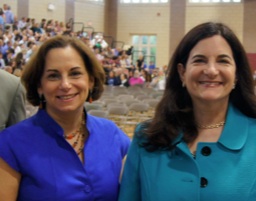Challenges Ahead for the Scarsdale Schools
- Category: Schools
- Published: Thursday, 14 July 2011 12:28
 Jill Spieler and Elizabeth Guggenheimer will continue to serve as President and Vice President of the Scarsdale School Board in 2011/12 for a second year. The duo was nominated by the Board to ensure continuity. Given the passage of the tax cap in Albany and continuing school budget pressure, we asked School Board President Jill Spieler to discuss the Board’s agenda for the coming year and here is what she said:
Jill Spieler and Elizabeth Guggenheimer will continue to serve as President and Vice President of the Scarsdale School Board in 2011/12 for a second year. The duo was nominated by the Board to ensure continuity. Given the passage of the tax cap in Albany and continuing school budget pressure, we asked School Board President Jill Spieler to discuss the Board’s agenda for the coming year and here is what she said:
The Board recognizes that it will be dealing with complex problems in 2011-12, but we are confident they can be faced. We’re facing unusual challenges and, naturally, trying to identify unusual, creative ways of dealing with them. It is important to keep them in perspective while we continue to build on the District’s educational goals.
While we want to respond to emerging economic and regulatory pressures, I think the assumption of most Scarsdale residents – is that we have to stay the course and keep on working methodically at what we’ve been doing: protecting and preserving, enhancing where possible, and looking for evolutionary, creative solutions to the challenges we face.
Our first educational responsibility is to provide our students an ever more excellent education, to prepare them for college and the larger world. Meanwhile, Scarsdale is exerting national and international leadership as it shapes an education for the future.
In some ways, an excellent education of 2050 will look familiar: It will center on the personal encounter between teacher and student, for instance. But its form will also continue to evolve through the use of technology, its focus on thinking and problem-solving, and its emphasis on skills and dispositions that are increasingly important in a global context: the capacity to collaborate and compete, an ability to persevere and withstand ambiguity, appreciation and empathy for human similarities and differences, for example.
In cooperation with Columbia University, Scarsdale has initiated an international benchmarking collaboration that involves high performance schools in the high performing nations of Australia, Canada, China, Finland and Singapore, as well as top-performance public schools in the U.S. and the highly selective Hotchkiss School in Connecticut. In this connection, among other things, we’re engaged in a long-term effort to evaluate and enhance our students’ critical and creative thinking, as well as their ability to solve the kinds of non-standard problems they’ll encounter later on in life. This work is just one part of our broader commitment to being “national schools in a global theatre.”
It’s not going to be easy to continue to grow and improve in our current environment. We’ve already created significant budget economies and cut back in many areas. Going forward, we face the challenge of the state tax cap that recently passed.
We will not be able to adhere to a cap of the lesser of 2% or the inflation rate without drastic reductions in staff and essential education programs. The Board and Administration will have to carefully work to construct a budget that will garner not just a majority, but a 60% super-majority of positive votes. The alternative will have dire consequences for Scarsdale Schools.
Also, the New York State Education Department recently issued new regulations for teacher evaluations. The new APPR (Annual Professional Performance Review) regulations are intended to improve teacher accountability, but we’re concerned that instead, they’ll promote more teaching to standardized tests and make it harder to create the education for the future our students will need for success after they leave us. Likewise, this overly-formulaic evaluation system, ironically, will make it harder to exercise the human judgment that is essential to discriminating decisions in personnel evaluation. The Board will work collaboratively with the Administration to develop faculty assessments that will maintain successful, proven results.
Last, and in connection with the budget cap, we intend to conduct a full inventory of capital needs, including both educational and infrastructure priorities, so that we can develop a strategy to address this important area. With the tax cap now in place, we face the prospect of budgets that could seriously underfund our buildings and grounds, ultimately leading to serious safety and building integrity concerns. In a hardscrabble long-term environment of minimal budget growth, we’re also unlikely to see any educational improvements to our facilities unless we develop long term plans that have broad community support.







